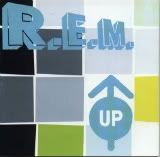Can't You See I Need Nothing Too Deep
 Up - 1998
Up - 1998
With the departure of drummer Bill Berry, the remaining trio of R.E.M. (Michael Stipe, Peter Buck, and Mike Mills) were put to the task of how to approach their next album. Berry was more than just a drummer. Apparently, he made no bones about giving his opinion on a song or making suggestions, and even had a hand in writing some of the music. He had also been playing bass on tracks that required Mike Mills to hop on the keyboards. While his background vocals were never as defining or signature as Mill's, Berry's lower voice always did a capable job of adding some lower register harmonies and was well utilized live. In other words, Bill Berry was a vital part of the band, but now the new R.E.M. was in a position to totally reinvent themselves.
While New Adventures in Hi-Fi has lost a little of its luster over the years, Up has done the opposite. Of all the post-Bill Berry records produced by R.E.M., Up has actually maintained some long term listenability. In fact, if it weren't so long and was trimmed down to about ten or eleven tracks, it might have been a rather excellent album. The atmosphere for most of Up is pretty chilled, which hasn't been an issue on past R.E.M. records like Automatic for the People. However, despite the strength of some of the later tracks, Up gets a bit snoozy at the end.
From the very beginning of Up, R.E.M. is letting the listener know that this record will not be like their past efforts. "Airportman" is an hypnotic soundscape of mantra-like mumbling from Stipe and feedback from Buck. Things really pick up with "Lotus", which is about as upbeat as the record gets. This is one of the few songs on the album that features a really strong guitar lick, but even its appearance on this track is fairly sparse.
R.E.M. change things up again on the third track with the amazingly, beautiful "Suspicion". This is a sultry, space-lounge number purred out by Stipe and held together with organ and vibes. This is one of the strongest tracks on Up even if it runs a little long. Gears shift again with "Hope", a strange electro-pop number that is dominated with buzzing noises and keyboards. R.E.M. has never attempted a song like this before, and the effort is commendable. In some ways, "Hope" is to R.E.M. as "Idioteque" is to Radiohead.
From this point on, Up falls into a pattern of mid-to-slow tempo songs. This framework is only deviated from on a few numbers. "Walk Unafraid" picks up the speed a little bit during the chorus. It's one of the album's highlights and features some of Stipe's best lyrical work on Up. While "Daysleeper" is still fairly low key, its arrangement is probably the closest to "classic" R.E.M. of anything on the record. It's not surprising that this was chosen as the lead off single for Up.
Despite some redundancy, Up is pretty pleasant. In hindsight, it's extremely strong when compared to the next two albums, Reveal and Around the Sun. At least R.E.M. was taking advantage of their line up change and decided to experiment, making the next two seem lazy and uninspired.
6 out of 10
1 comment:
I personally think this is one of the better post IRS REM records. Perhaps I picked it up at a time in my life where I was simply more disposed to liking it, but other than Murmur, I probably listened to this REM record more than any other.
The songs were haunting and different, but they still had a raw feel to them that their subsequent records didn’t contain.
Post a Comment